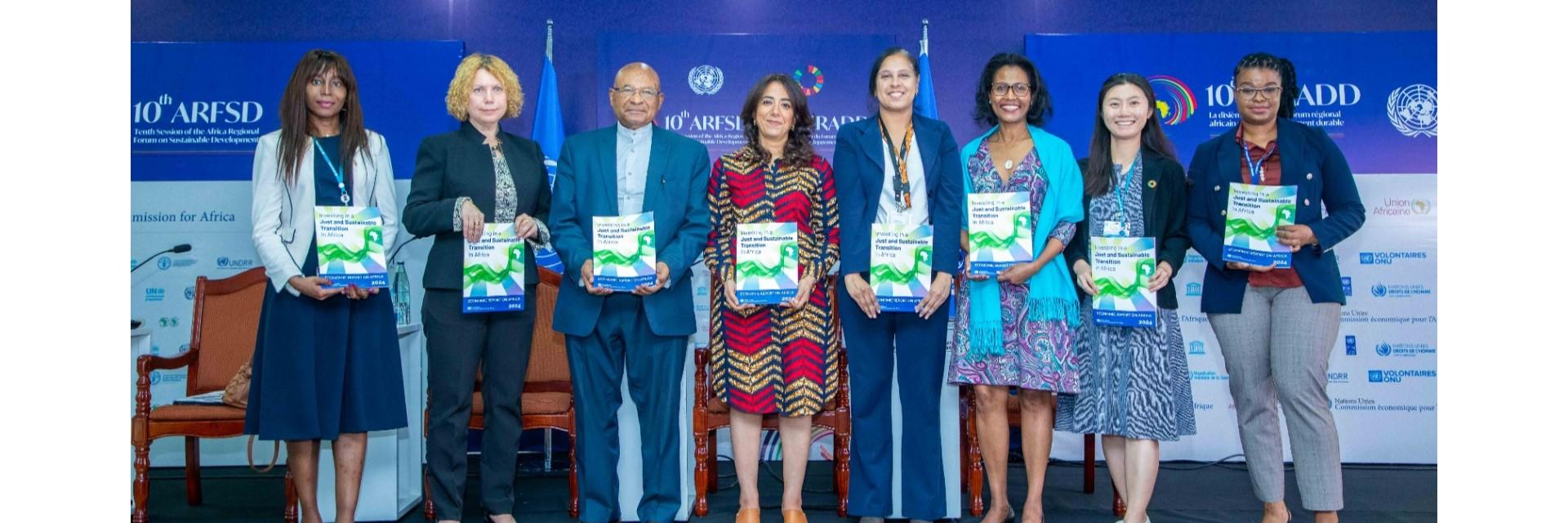Addis Ababa, 24 April 2024 – African countries face many economic, social, and environmental challenges. These global challenges render “business as usual” strategies unsustainable, and a new transformative approach is needed for a Just and Sustainable Transition (JST) in Africa, according to the Economic Report on Africa 2024.
The 2024 Economic Report on Africa themed “Investing in a Just and Sustainable Transition in Africa” was launched in Addis Ababa on 24th April 2024. The report analyses the opportunities and policies for Africa to build a just and sustainable economic system. For this to materialize, African countries need holistic development plans and strategies that fundamentally redirect their production, consumption, governance, technology, human capital, and financial systems.
In his opening remarks, Mr. Claver Gatete, Executive Secretary, United Nations Economic Commission for Africa (UNECA), stated that a just and sustainable transition that ensures accelerated, inclusive, and sustainable growth, as well as diversification and green industrialization will help Africa reach its potential.
Ms. Zuzana Schwidrowski, Director, Macroeconomics and Governance Division, UNECA, delivering the presentation on the report, highlighted that Africa has window of opportunity to undertake impactful JST guided by an African-informed narrative and needs. Factors such as youthful population, arable land, renewable resource endowments, huge deposits of strategic minerals, and latecomer advantages from emerging technologies position Africa to shape the sustainability transition at the global level.
To reach its objectives, the JST needs to reflect Africa’s specificities. An interpretation of a JST that serves Africa’s needs to be well defined as an economic system encompassing environmental sustainability, social mitigation, and green industrialization. In view of this, achieving JSTs in Africa requires fundamental shifts at the economic (especially production and consumption), governance, and technology-systems. These shifts need to be driven by efficient natural resource use, sustainable infrastructure development, low-carbon industrialization, and resilient agroecological systems.
In addition, financing JST in Africa is crucial to ensure inclusive development of low-carbon resilient economies without compromising prosperity. Transitioning will require significant resources to fund capital, financial innovation, and social protection systems and the continent will need to catalyse innovative approaches. The international financial architecture also requires a paradigm shift.
While pursuing the JST, African policy makers are suggested to take a forward-looking vision and strategies that maximize the continent’s benefits from emerging economic and technological opportunities and use continental mechanisms. It is also recommended that African countries expand their fiscal space by strategically leveraging their natural resources. This can be done by developing strategic minerals, national capital accounting, curbing illicit financial flows, and leveraging the continent’s strategic role in the evolving geopolitical landscape.
In the closing remarks, Ms. Hanan Morsy, Deputy Executive Secretary-Programme, UNECA, reaffirmed the willingness of UNECA to assist Member states in their efforts to implement JST. “Given the magnitude of the challenge that climate change alongside rising inequality and poverty present, there is no time to waste. The time to act is now.”
Issued by:
Communications Section
Economic Commission for Africa
PO Box 3001
Addis Ababa
Ethiopia
Tel: +251 11 551 5826
E-mail: eca-info@un.org

